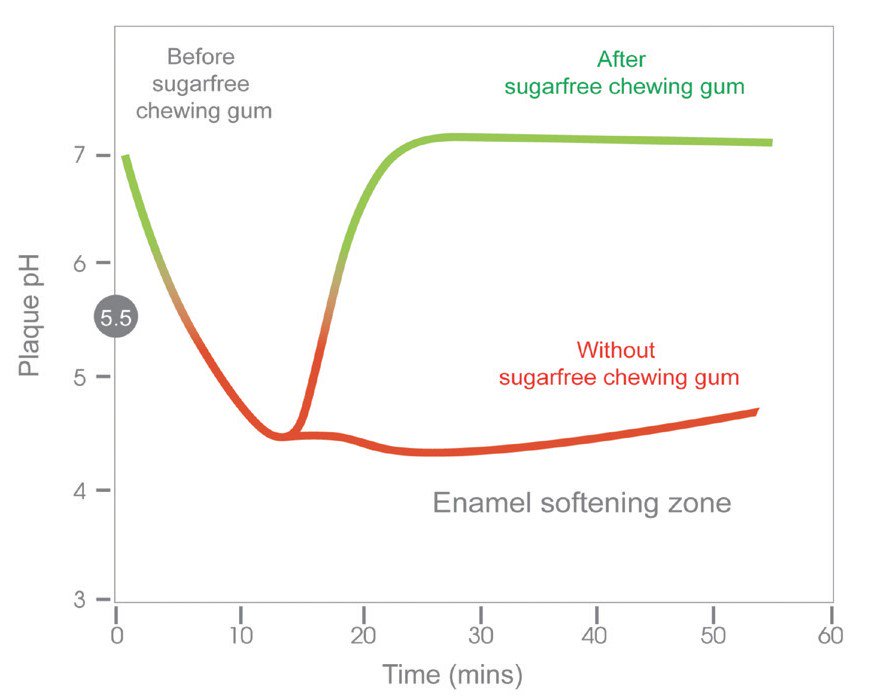What is sugar-free gum?
Sugar-free chewing gum does not contain any sugar in it. The chewing gum releases its flavors over a period of time, just like ordinary gum.
Why is chewing sugar-free gum good for my teeth?
Chewing sugar-free gum helps to prevent teeth in between meals when it may not be possible to brush with a toothbrush and fluoride toothpaste.
Your teeth are more at risk of an acid attack after you have eaten. The acid is produced by the bacteria, and the sugars in our food and drink, and it slowly dissolves the enamel and dentine of the tooth, to produce a hole or ‘cavity‘. (Plaque is the thin layer of sticky film that keeps forming on your teeth. It contains many types of bacteria which can cause cavity and gum disease.
You can defeat this acid attack by chewing sugar-free gum, as it helps the mouth to produce more saliva – the mouth’s natural defense against acid and bacteria.
Can sugar-free gum help to preserve against dental erosion?
Dental erosion is caused by the acids in the foods we eat and drink, such as citrus fruits, and fizzy drinks. These start to wear the enamel covering the teeth and remove some of the minerals harming the enamel. By helping us produce more saliva, chewing sugar-free gum can also help to decrease this type of acid in our mouth.
It takes the saliva about an hour to restore the minerals that the enamel has lost. Chewing sugar-free gum about 20 minutes after eating or drinking can increase the flow of saliva, and help replace the minerals more quickly.
See the diagram below

It reveals how your tooth enamel is at risk from bacteria attack after food and drink, and how long it takes the acid level in the mouth to return to the safe zone. pH is the standard for acidity, with levels below 5.5 being acid enough to soften tooth enamel. Chewing sugar-free gum after eating can quickly lower the amount of acid that attacks the teeth.
Can chewing sugar-free gum help with bad breath and dry mouth?
Dry mouth and bad breath are often caused by a less saliva flow. When you chew sugar-free gum your mouth produces more saliva and the symptoms of dry mouth and bad breath may be decreased.
What is Xylitol and where does it come off?
Xylitol is a natural sweetener and is found in some fruit, berries, vegetables, and mushrooms. It has a sweetness equal to that of sugar. Xylitol is normally made from birch bark.
Why is Xylitol particularly good for my teeth?
Xylitol helps to prevent plaque bacteria from sticking to the teeth. Studies have shown that xylitol can help reduce cavity and even help reverse the cavity itself by helping to restore the minerals in tooth enamel.
What is the right time to chew sugar-free gum?
It is best to chew right after eating. Chewing about twenty minutes increases the stream of saliva, speeding up the time that it takes for saliva to remove the acid.
How many times a day can I chew?
It is suggested to chew sugar-free gum after eating and drinking on the go.
Is sugar-free gum safe to use for kids?
We do not suggest that children under the age of seven chew gum. But this is something for parents to decide.
Is sugar-free gum suitable for vegetarians?
Some chewing gums can carry animal glycerine and are not suitable for vegetarians. However, most sugar-free gums now only contain a type of non-animal glycerine and are proper for vegetarians.
Can I chew sugar-free gum if I’m wearing dentures or braces?
People with certain types of dentures may find that sugar-free gum difficult as it sticks to the teeth and palate of the denture. Sugar-free gum is not recommended if you have an orthodontic brace.
Do I still need to brush and floss my teeth if I’ve used chewing gum?
Yes. You will still need to brush twice a day with fluoride toothpaste, and clean in between your teeth with interdental brushes or floss at least once a day to keep your teeth and gums healthy.
Are gum sticks and gum pellets different?
The main difference between sticks and pellets is the size. Pellets are smaller than sticks so they may be better for children and people with smaller mouths.
What happens if I swallow the gum?
There is no indication that swallowing gum is harmful. Swallowed gum will pass through your system like any other food, although it may take a little longer.
Can sugar-free gum whiten my teeth?
Some sugar-free chewing gums have a ‘whitening’ claim. Although these products cannot lighten the natural color of your teeth, they may help to lessen any staining which could build-up on your teeth due to smoking, or drinking red wine or coffee.
Dr. Zeta Anato Dental Director of Sabka dentist says “Reducing acid level in the mouth greatly helps to prevent cavity. And Sugar-free gum helps for this action”.
Dr. Manan Dhulia Dental Director of Sabka dentist says “Chewing gum is the great resource because after every meal you cannot deep clean the mouth when you are busy. But chewing sugar-free gum will fight with the acids when you can not clean during the day”.
Dr. Preethi Nagarajan Dental Director of Sabka dentist says “Sugar-free gum not only fight with a cavity but also keep your mouth fresh”.










